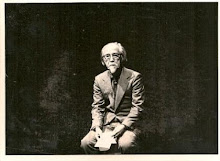

In Anatole Litvak's film City for Conquest not only is New York City elevated to the status of being the only American city that matters, but it also offers us a window into the lives of three of its most ambitious inhabitants. James Cagney plays Danny Kenny, a boxer, whose talent for fighting is matched only by his love for the girl of his dreams, Peggy Nash. Ann Sheridan, in the role of Peggy, is the girl next door who wishes to see her name in lights. And finally the third character is Danny's brother Eddie, played by Arthur Kennedy, who tries to parlay his musical talent into a viable career.

The great debate within the film is the struggle of values vs. ambition. Each of the three main characters starts the film off with a certain set of ideals. Danny only boxes so that he can pay for his brother's tuition, Peggy is content dancing in neighborhood contests, and Eddie quietly works on his own musical compositions while giving piano lessons to neighborhood kids. As the film progresses each of these characters runs up against an individual who exploits their ambitions and each of them gets corrupted by their own personal desires.
Although Peggy is content to dance in small dance halls she dreams of seeing her name in lights and the pull of celebrity soon corrupts her till she eventually goes from having her name at the top of a marquee to dancing for a burlesque show. Eddie works at being a legitimate composer, but the desire for recognition has him churning out Broadway pop songs. Danny, on the other hand, is the most unambitious character in the story. All he is after is a simple life with Peggy and sees being at the top of his sport as the only way to get her back.
Each of the three characters sells themselves for transitory pleasures, and in the case of Danny and Peggy are left with nothing. The only good thing to come from all their suffering is that Peggy finally returns to Danny and he, in turn, is granted what he had originally wanted, a simple life with Peggy. Eddie is the only one who comes out of the story relatively unscathed and also triumphant. His brother's brutal beating and subsequent blindness in the ring causes him to reassess exactly what his real priorities are.


The film's use of process shots and on-location footage of New York creates a very romanticized view of the city. Anatole Litvak, with some uncredited work by Jean Negulesco, presents a city where even if your dreams don't come true you can at least fall back on your friends for support. The New York in this film may not have ever really existed, but you can't fault them for tapping into the audience's belief that even if you don't achieve the goals you have set out for yourself, by the mere fact that you have survived is an achievement unto itself.




No comments:
Post a Comment